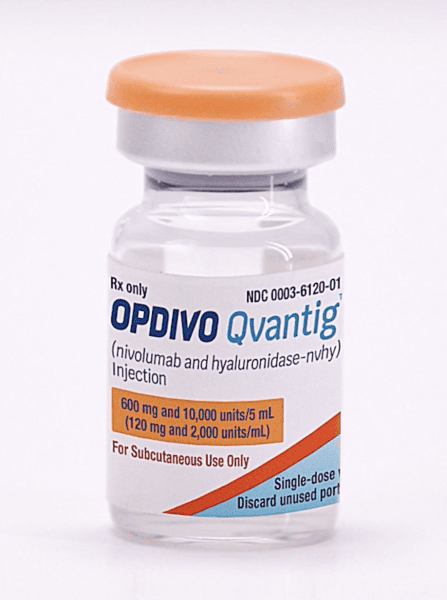Hyaluronidase/nivolumab Disease Interactions
There are 5 disease interactions with hyaluronidase / nivolumab.
Nivolumab (applies to hyaluronidase/nivolumab) hepatic impairment
Moderate Potential Hazard, Moderate plausibility. Applicable conditions: Liver Disease
There are no data available on the use of nivolumab-containing products in patients with severe hepatic impairment or autoimmune liver disease. No dose adjustment is recommended for patients with mild or moderate hepatic impairment during use of IV nivolumab; data not available for subcutaneous nivolumab. Monitor liver enzymes at baseline and periodically during therapy. Therapy with nivolumab-containing products may cause immune-mediated hepatitis and/or hepatotoxicity.
References (2)
- (2023) "Product Information. Opdivo (nivolumab)." Bristol-Myers Squibb, SUPPL-119
- (2024) "Product Information. Opdivo Qvantig (hyaluronidase-nivolumab)." Bristol-Myers Squibb
Nivolumab (applies to hyaluronidase/nivolumab) pneumonitis
Moderate Potential Hazard, Moderate plausibility. Applicable conditions: Pleuropulmonary Infection, History - Radiation Therapy
Use of nivolumab-containing products can cause immune-mediated pneumonitis. The incidence of pneumonitis is higher in patients who have received prior thoracic radiation.
References (2)
- (2023) "Product Information. Opdivo (nivolumab)." Bristol-Myers Squibb, SUPPL-119
- (2024) "Product Information. Opdivo Qvantig (hyaluronidase-nivolumab)." Bristol-Myers Squibb
PD-1/PD-L1 inhibitors (applies to hyaluronidase/nivolumab) HSCT
Moderate Potential Hazard, Moderate plausibility. Applicable conditions: Bone Marrow Transplantation
Fatal and other serious complications can occur in patients who receive allogeneic hematopoietic stem cell transplantation (HSCT) before or after being treated with a programmed death receptor-1/ligand-1 (PD-1/PD-L1) blocking antibody. Transplant-related complications include hyperacute graft-versus-host disease (GVHD), acute GVHD, chronic GVHD, hepatic veno-occlusive disease after reduced intensity conditioning, and steroid-requiring febrile syndrome (without an identified infectious cause). These complications may occur despite intervening therapy between PD-1/PD-L1 blockade and allogeneic HSCT. It is recommended to follow patients closely for evidence of transplant-related complications and intervene promptly. The benefit versus risks of treatment with a PD-1/PD-L1 blocking antibody before or after an allogeneic HSCT should be considered.
References (11)
- (2024) "Product Information. Opdivo Qvantig (hyaluronidase-nivolumab)." Bristol-Myers Squibb
- (2025) "Product Information. Penpulimab (penpulimab)." Akeso Biopharma
- (2025) "Product Information. Tevimbra (tislelizumab)." BeiGene USA, Inc, SUPPL-4
- (2024) "Product Information. Tecentriq (atezolizumab)." Genentech, SUPPL-53
- (2025) "Product Information. Bavencio (avelumab)." EMD Serono Inc, SUPPL-21
- (2024) "Product Information. Libtayo (cemiplimab)." Regeneron Pharmaceuticals Inc, SUPPL-23
- (2024) "Product Information. Jemperli (dostarlimab)." GlaxoSmithKline, SUPPL-9
- (2025) "Product Information. Imfinzi (durvalumab)." Astra-Zeneca Pharmaceuticals, SUPPL-50
- (2025) "Product Information. Opdivo (nivolumab)." Bristol-Myers Squibb, SUPPL-131
- (2025) "Product Information. Keytruda (pembrolizumab)." Merck Sharp & Dohme LLC, SUPPL-178
- (2025) "Product Information. Zynyz (retifanlimab)." Incyte Corporation, SUPPL-4
PD-1/PD-L1 inhibitors (applies to hyaluronidase/nivolumab) immune system disorder
Moderate Potential Hazard, Moderate plausibility. Applicable conditions: Autoimmune Disorder
Programmed death receptor-1/ligand-1 (PD-1/PD-L1) blocking antibodies can cause immune-mediated adverse reactions, which may be severe or fatal. Immune-mediated adverse reactions can occur in any organ system or tissue at any time after starting therapy. This may be considered when using PD-1/PD-L1 blocking antibodies in patients with immune system disorders (e.g., ulcerative colitis, Crohn's disease, lupus) or with conditions affecting the nervous system (e.g., myasthenia gravis, Guillain-Barre syndrome). It is recommended to monitor patients closely for signs/symptoms that may be clinical manifestations of underlying immune-mediated adverse reactions.
References (8)
- (2025) "Product Information. Penpulimab (penpulimab)." Akeso Biopharma
- (2025) "Product Information. Tevimbra (tislelizumab)." BeiGene USA, Inc, SUPPL-4
- (2024) "Product Information. Tecentriq (atezolizumab)." Genentech, SUPPL-53
- (2025) "Product Information. Bavencio (avelumab)." EMD Serono Inc, SUPPL-21
- (2024) "Product Information. Jemperli (dostarlimab)." GlaxoSmithKline, SUPPL-9
- (2025) "Product Information. Imfinzi (durvalumab)." Astra-Zeneca Pharmaceuticals, SUPPL-50
- (2025) "Product Information. Opdivo (nivolumab)." Bristol-Myers Squibb, SUPPL-131
- (2025) "Product Information. Zynyz (retifanlimab)." Incyte Corporation, SUPPL-4
PD-1/PD-L1 inhibitors (applies to hyaluronidase/nivolumab) organ transplant
Moderate Potential Hazard, Moderate plausibility.
Solid organ transplant rejection and other transplant (including corneal graft) rejection have been reported with the use of programmed death receptor-1/ligand-1 (PD-1/PD-L1) blocking antibodies. This may be considered when using PD-1/PD-L1 blocking antibodies in patients who have received a solid organ or other transplant.
References (11)
- (2024) "Product Information. Opdivo Qvantig (hyaluronidase-nivolumab)." Bristol-Myers Squibb
- (2025) "Product Information. Penpulimab (penpulimab)." Akeso Biopharma
- (2025) "Product Information. Tevimbra (tislelizumab)." BeiGene USA, Inc, SUPPL-4
- (2024) "Product Information. Tecentriq (atezolizumab)." Genentech, SUPPL-53
- (2025) "Product Information. Bavencio (avelumab)." EMD Serono Inc, SUPPL-21
- (2024) "Product Information. Libtayo (cemiplimab)." Regeneron Pharmaceuticals Inc, SUPPL-23
- (2024) "Product Information. Jemperli (dostarlimab)." GlaxoSmithKline, SUPPL-9
- (2025) "Product Information. Imfinzi (durvalumab)." Astra-Zeneca Pharmaceuticals, SUPPL-50
- (2025) "Product Information. Opdivo (nivolumab)." Bristol-Myers Squibb, SUPPL-131
- (2025) "Product Information. Keytruda (pembrolizumab)." Merck Sharp & Dohme LLC, SUPPL-178
- (2025) "Product Information. Zynyz (retifanlimab)." Incyte Corporation, SUPPL-4
Switch to consumer interaction data
Hyaluronidase/nivolumab drug interactions
There are 678 drug interactions with hyaluronidase / nivolumab.
More about hyaluronidase / nivolumab
- hyaluronidase/nivolumab consumer information
- Check interactions
- Compare alternatives
- Side effects
- Dosage information
- During pregnancy
- Drug class: anti-PD-1 and PD-L1 monoclonal antibodies (immune checkpoint inhibitors)
- En español
Related treatment guides
Drug Interaction Classification
| Highly clinically significant. Avoid combinations; the risk of the interaction outweighs the benefit. | |
| Moderately clinically significant. Usually avoid combinations; use it only under special circumstances. | |
| Minimally clinically significant. Minimize risk; assess risk and consider an alternative drug, take steps to circumvent the interaction risk and/or institute a monitoring plan. | |
| No interaction information available. |
See also:
Further information
Always consult your healthcare provider to ensure the information displayed on this page applies to your personal circumstances.


